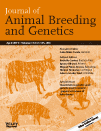Ver ítem
- xmlui.general.dspace_homeCentros Regionales y EEAsCentro Regional Patagonia NorteEEA BarilocheArtículos científicosxmlui.ArtifactBrowser.ItemViewer.trail
- Inicio
- Centros Regionales y EEAs
- Centro Regional Patagonia Norte
- EEA Bariloche
- Artículos científicos
- Ver ítem
Community-based livestock breeding programmes : essentials and examples
Resumen
Breeding programmes described as community-based (CBBP) typically relate to low-input systems with farmers having a common interest to improve and share their genetic resources. CBBPs are more frequent with keepers of small ruminants, in particular smallholders of local breeds, than with cattle, pigs or chickens with which farmers may have easier access to alternative programmes. Constraints that limit the adoption of conventional breeding technologies in
[ver mas...]
Breeding programmes described as community-based (CBBP) typically relate to low-input systems with farmers having a common interest to improve and share their genetic resources. CBBPs are more frequent with keepers of small ruminants, in particular smallholders of local breeds, than with cattle, pigs or chickens with which farmers may have easier access to alternative programmes. Constraints that limit the adoption of conventional breeding technologies in low-input systems cover a range of organizational and technical aspects. The analysis of 8 CBBPs located in countries of Latin-America, Africa and Asia highlights the importance of bottom-up approaches and involvement of local institutions in the planning and implementation stages. The analysis also reveals a high dependence of these programmes on organizational, technical and financial support. Completely self-sustained CBBPs seem to be difficult to realize. There is a need to implement and document formal socio-economic evaluations of CBBPs to provide governments and other development agencies with the information necessary for creating sustainable CBBPs at larger scales
[Cerrar]

Autor
Mueller, Joaquin Pablo;
Rischkowsky, Barbara;
Haile, Aynalem;
Philipsson, J.;
Mwai, O.;
Besbes, B.;
Valle Zárate, A.;
Tibbo, M.;
Mirkena, T.;
Duguma, G.;
Sölkner, J.;
Wurzinger, M.;
Fuente
Journal of animal breeding and genetics 132 (2) : 155–168. (April 2015)
Fecha
2015-04
ISSN
0931-2668 (Print)
1439-0388 (Online)
1439-0388 (Online)
Formato
pdf
Tipo de documento
artículo
Palabras Claves
Derechos de acceso
Restringido
 Excepto donde se diga explicitamente, este item se publica bajo la siguiente descripción: Creative Commons Attribution-NonCommercial-ShareAlike 2.5 Unported (CC BY-NC-SA 2.5)
Excepto donde se diga explicitamente, este item se publica bajo la siguiente descripción: Creative Commons Attribution-NonCommercial-ShareAlike 2.5 Unported (CC BY-NC-SA 2.5)

